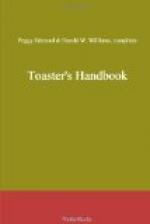“In the first place, where did you meet this woman who, according to your story, has treated you so dreadfully?” asked the judge.
“Well,” replied the little man, making a brave attempt to glare defiantly at his wife, “I never did meet her. She just kind of overtook me.”
“Harry, love,” exclaimed Mrs. Knowall to her husband, on his return one evening from the office, “I have b-been d-dreadfully insulted!”
“Insulted?” exclaimed Harry, love. “By whom?”
“B-by your m-mother,” answered the young wife, bursting into tears.
“My mother, Flora? Nonsense! She’s miles away!”
Flora dried her tears.
“I’ll tell you all about it, Harry, love,” she said. “A letter came to you this morning, addressed in your mother’s writing, so, of course, I—I opened it.”
“Of course,” repeated Harry, love, dryly.
“It—it was written to you all the way through. Do you understand?”
“I understand. But where does the insult to you come in?”
“It—it came in the p-p-postscript,” cried the wife, bursting into fresh floods of briny. “It s-said: ’P-P-P. S.—D-dear Flora, d-don’t f-fail to give this l-letter to Harry. I w-want him to have it.’”
“By jove, I left my purse under the pillow!”
“Oh, well, your servant is honest, isn’t she?”
“That’s just it. She’ll take it to my wife.”
There swims no goose so gray, but soon
or late
She finds some honest gander for her mate.
—Pope.
A clerk showed forty patterns of ginghams to a man whose wife had sent him to buy some for her for Christmas, and at every pattern the man said: “My wife said she didn’t want anything like that.”
The clerk put the last piece back on the shelf. “Sir,” he said, “you don’t want gingham. What you want is a divorce.”
Maids are May when they are maids, but the sky changes when they are wives.—Shakespeare.
In the election of a wife, as in
A project of war, to err but once is
To be undone forever.
—Thomas Middleton.
Of earthly goods, the best is a good wife;
A bad, the bitterest curse of human life.
—Simonides.
See also Domestic finance; Suffragettes; Talkers; Temper; Woman suffrage.
WOMAN
Woman—the only sex which attaches more importance to what’s on its head than to what’s in it.
“How very few statues there are of real women.”
“Yes! it’s hard to get them to look right.”
“How so?”
“A woman remaining still and saying nothing doesn’t seem true to life.”
“Oh, woman! in our hours
of ease
Uncertain, coy, and hard to
please”—
So wrote Sir Walter long ago.
But how, pray, could he really
know?
If woman fair he strove to
please,
Where did he get his “hours
of ease”?




